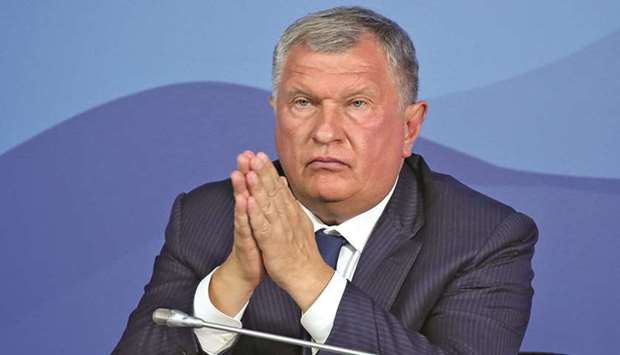Russian oil giant Rosneft PJSC agreed to sell a stake in its Vostok Oil mega project to a consortium including Vitol Group, raising more money from trading houses after a Trafigura Group deal last year.
Vitol and Mercantile & Maritime will pick up 5% stake in the project, Rosneft said in a statement, without disclosing the size of the deal. Trafigura paid €7bn ($8.5bn) for its 10% stake, Rosneft said in February.
Russia’s biggest oil producer is turning to trading houses even as many Western energy majors and investors have been reluctant to back big new oil projects, especially in environmentally fragile areas like the Arctic where Vostok Oil is located. The traders, flush with cash from record earnings as the pandemic caused dramatic price swings, are looking to lock in long-term supplies.
The project is “interesting to the companies focused on feedstock supply, trading and logistics” that support wide distribution channels, Rosneft chief executive officer Igor Sechin said.
Turning to traders: Rosneft, partly shut out of the global financial system because of US sanctions on Russia, needs the traders’ cash. The Trafigura deal valued the Vostok Oil project at $85bn – more than the market capitalisation of Rosneft itself.
The trading houses are making large financial commitments in the project that could pump 1mn barrels a day of oil by 2027. Trafigura raised a €5.78bn loan organised by a Russian bank to fund the acquisition, according to regulatory filings.
It’s unclear how Vitol, who last year reported its strongest ever net income of about $3bn, plans to finance the purchase. The acquisition is expected to close after the parties receive the required regulatory and corporate approvals, according to the statement.
Vitol’s partner in the deal, Mercantile & Maritime, is led by a publicity-shy oil industry veteran named Murtaza Lakhani. Bloomberg News has reported that Lakhani and his companies have served as a conduit for large payments to the government of Kurdistan from oil traders and companies like Rosneft.
A Vitol spokeswoman in London wouldn’t comment on the proposed Vostok Oil transaction. An e-mail and phone calls to Mercantile and Maritime weren’t immediately answered.
A spokesperson for Lakhani previously told Bloomberg News that his oil and financing deals have always followed applicable laws and regulations.
Arctic ambitions: For the traders, Vostok Oil offers access to Asian markets through the Arctic Northern Sea Route, a much shorter passage to Asian markets compared with the Suez Canal, Citigroup Inc said in a report. The project envisions output of some 25mn tonnes of oil annually, or around 500,000 barrels a day, in 2024, and twice as much in 2027. At its peak, the remote development is set to produce as much as 100mn tonnes per year. That compares with Russia’s total crude oil and condensate production of 513mn tonnes for 2020.
Production in environmentally fragile regions like the Arctic are becoming more controversial as controlling climate change becomes more urgent. But Rosneft is pressing on with the Vostok project. Presenting Russian President Vladimir Putin with a flask of the crude produced at one of the Vostok Oil wells last year, Sechin said it’s “even better than in the Middle East.”
Earlier this month, he warned of a “severe” oil deficit as global producers increasingly channel funds into a “hasty” energy shift amid mounting pressure to switch to cleaner energy. Vostok Oil consists of several fields on the Taymyr peninsula in the Krasnoyarsk region, with a confirmed resource base of over 6bn tonnes of premium low-sulphur crude, according to Rosneft.
The project has a low cost per barrel of production, “with a carbon footprint 75% below that of other major new oil projects in the world,” it said in Thursday’s statement.
It’s also of strategic importance for Russia and will help the country maintain its global market share, Citigroup said. The project could account for over 20% of Russia’s total output by early next decade, the bank said.

Igor Sechin, Rosneft chief executive officer.
